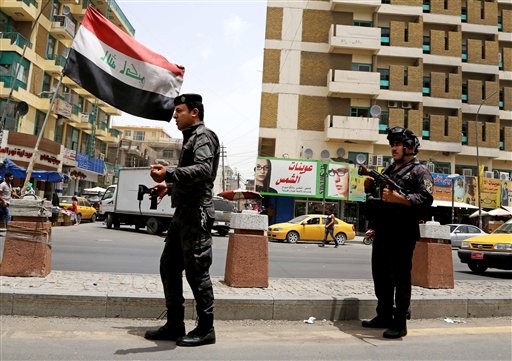BAGHDAD (AP) — Al-Qaida-inspired militants seized effective control Wednesday of Saddam Hussein’s hometown of Tikrit, expanding their offensive closer to the Iraqi capital as soldiers and security forces abandoned their posts following clashes with the insurgents.
Fighters from the Islamic State of Iraq and the Levant took control a day earlier of much of Mosul, Iraq’s second-largest city, in a major blow to the authority of the country’s Shiite government. An estimated half a million residents fled the economically important city.
Residents reached by telephone in Sunni-dominated Tikrit said the Sunni militant group had taken over several police stations. They spoke on condition of anonymity for fear of their safety.
Two Iraqi security officials confirmed Tikrit was under the control of the ISIL, and said the provincial governor was missing. The officials insisted their names not be used because they weren’t authorized to release the information. Tikrit, the capital of Salahuddin province, is 130 kilometers (80 miles) north of Baghdad.
Prime Minister Nouri al-Maliki said the massive security failure in Sunni-dominated Ninevah province that allowed militants to seize Mosul was the result of a “conspiracy,” and that those members of the security forces who fled rather than stand up to the militants should be punished.
He stopped short of assigning direct blame, however, choosing to focus instead on plans to fight back — without detailing the specifics.
“Today, the important thing is that we are working to solve the situation,” a stern-faced al-Maliki said. “We are making preparations and we are regrouping the armed forces that are in charge of clearing Ninevah from those terrorists.”
The stunning assault by the al-Qaida-inspired group saw black banner-waving insurgents raid government buildings, push out security forces and capture military vehicles as residents fled for their lives.
Mosul is the capital of Ninevah province. It and the neighboring Sunni-dominated province of Anbar share a long and porous border with Syria, where the Islamic State is also active.
Ninevah governor Atheel al-Nujaifi told reporters that “Mosul is capable of getting back on its feet and getting rid of all the outsiders,” and said authorities planned to mobilize residents into popular militias that would play a role in retaking the city.
There were no immediate estimates on how many people were killed in the assault but the rampage sent an estimated 500,000 people fleeing from the city and surrounding areas, according to the International Organization for Migration.
Some simply crossed to the eastern bank of the Tigris River to avoid the worst of the fighting, while others made their way to the Ninevah countryside or sought refuge in the nearby semiautonomous Kurdish region.
Getting into that area has grown trickier, however, with migrants without family members already in the enclave needing to secure permission from Kurdish authorities, according to the IOM.
Iraqi Foreign Minister Hoshyar Zebari said the fall of the major northern city to insurgents must push the country’s leaders to work together and deal with the “serious, mortal threat” facing Iraq.
Speaking on the sidelines of a diplomatic meeting in Athens, he said Iraqi troops and forces belonging to the Kurdish region’s government could work together to push the insurgents out.
“We can push back on the terrorists … and there would be a closer cooperation between Baghdad and the Kurdistan Regional Government to work together and try to flush out these foreign fighters,” he said.
Mosul residents reached Wednesday said gunmen went around knocking on their doors, reassuring locals they would not be harmed and urging civil servants to return to work. The situation appeared calm but tense, said the residents, who spoke on condition of anonymity out of concerns for their safety.
In an eastern section of the city, 34-year-old Ali Sameer said mosques in his neighborhood were calling on people to return to work, especially those in public services.
Mosul’s fall was a heavy defeat for al-Maliki amid a widening insurgency by the Islamic State of Iraq and the Levant. The group has been advancing in both Iraq and neighboring Syria, capturing territory in a campaign to set up a militant enclave straddling the border.
Al-Maliki has pressed parliament to declare a state of emergency over the Mosul attack.
Echoing al-Maliki, Ninevah governor al-Nujaifi accused senior security force commanders of providing Baghdad with false information about the situation in Mosul and demanded they stand trial.
Speaking from the northern Kurdish city of Irbil where he took refuge, he said smaller armed groups had joined the Islamic State during the fight for control of the city.
Violence raged elsewhere in Iraq too on Wednesday.
Police and hospital officials said a suicide bomber set off his explosive belt inside a tent where tribesmen were meeting to solve a tribal dispute in Baghdad’s Shiite Sadr City neighborhood, killing 24 and wounding 41.
A car bomb struck Shiite pilgrims heading to the holy city of Karbala, killing four people and wounding 10, and another killed three people and wounded 12 in a town just south of Baghdad. All officials discussed the attacks on condition of anonymity because they were not authorized to speak to the media.
___
Associated Press Writers Adam Schreck in Dubai, United Arab Emirates, Elena Becatoros in Athens and Qassim Abdul-Zahra in Boston contributed to this report.

COMMENTS
Please let us know if you're having issues with commenting.